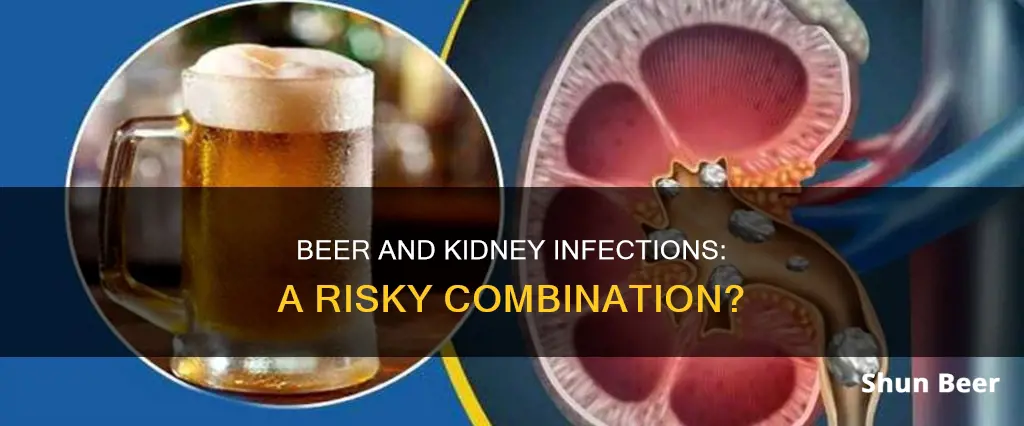
Drinking alcohol, including beer, is generally not recommended for people with kidney disease or infection. Alcohol can negatively impact kidney function and cause dehydration, high blood pressure, and liver disease. It can also interact with medications and affect blood sugar levels. However, occasional moderate alcohol consumption, such as one standard drink per day, may not significantly increase the risk of kidney disease for most people. It is always advisable to consult a doctor or dietitian for personalized advice regarding alcohol consumption, especially for those with kidney-related health issues.
What You'll Learn

Alcohol intake and blood pressure
The effects of alcohol on blood pressure are biphasic. Alcohol decreases blood pressure initially (up to 12 hours after ingestion) and increases blood pressure after that. Alcohol consistently increases heart rate within 24 hours of consumption.
Several mechanisms explain the effects of alcohol on blood pressure. Firstly, acute alcohol consumption affects the renin-angiotensin-aldosterone system (RAAS) by increasing plasma renin activity. The RAAS is responsible for maintaining fluid and electrolyte balance. An increase in plasma renin results in increased production of angiotensin II (AII), a potent vasoconstrictor that stimulates aldosterone and vasopressin secretion. As a result, peripheral resistance and blood volume increase, leading to elevated arterial blood pressure.
Secondly, alcohol stimulates the sympathetic nervous system, increasing noradrenaline levels. When noradrenaline stimulates adrenergic receptors in the heart muscles, heart rate and blood pressure rise.
Thirdly, alcohol diminishes baroreceptor sensitivity, which is crucial for blood pressure regulation. Acute alcohol administration stimulates the release of histamine and endorphins, which interfere with baroreflex sensitivity.
Finally, heavy alcohol consumption increases plasma cortisol levels, and cortisol has been associated with elevated blood pressure.
It is important to note that alcohol can interact with medications, including those for diabetes, heart disease, sleep, and pain. Therefore, it is essential to consult a healthcare professional or pharmacist before consuming alcohol, especially if you have a kidney infection or any other health condition. They can provide personalised advice and help you make informed decisions about alcohol consumption.
Beer and Bariatric Surgery: What You Need to Know
You may want to see also

Alcohol's impact on medication
Alcohol can have harmful interactions with prescription medications, over-the-counter drugs, and even some herbal remedies. Hundreds of commonly used prescription and over-the-counter drugs may adversely interact with alcohol.
Changes in Blood Pressure
Alcohol can alter the metabolism and pharmacological effects of many common medications, and many medications can alter the absorption and metabolism of alcohol. Alcohol can make your blood pressure and heart rate go up, increasing your risk of heart attack and stroke.
Loss of Coordination
Combining alcohol with certain medications, particularly those with sedative effects, can increase the risk of adverse events, including falls, driving accidents, and fatal overdoses. Alcohol increases the sedative effects of some medications, as well as the impairments in balance, reaction time, and motor coordination caused by these medications.
Intensified Side Effects
Even in small amounts, alcohol may intensify medication side effects such as sleepiness, drowsiness, and light-headedness, which may interfere with your concentration and ability to operate machinery or drive a vehicle, leading to serious or even fatal accidents.
Decreased Effectiveness of Medication
In some cases, alcohol interactions may decrease the effectiveness of medications or render them useless. Alcohol may reduce antidepressant response and decrease patient adherence.
Increased Toxicity
In other cases, alcohol interactions may make drugs harmful or even toxic to the body. For example, combining the pain reliever acetaminophen (available over the counter as Tylenol and in some prescription drugs) with alcohol can lead to severe liver damage, including some cases requiring a liver transplant.
Internal Bleeding
Combining alcohol with medications such as nonsteroidal anti-inflammatory drugs (NSAIDs) can increase the risk of gastrointestinal bleeding.
Other Health Risks
Other health risks associated with mixing alcohol and medications include heart problems, such as changes in the heart's regular heartbeat (arrhythmia), liver damage, nausea, vomiting, headaches, fainting, and memory problems.
Do Actors Drink Real Beer While Filming?
You may want to see also

Alcohol and blood sugar levels
While drinking alcohol in moderation is generally considered safe for healthy individuals, it can have significant effects on blood sugar levels, especially for people with diabetes. Alcohol is classified as a sedative-hypnotic drug, acting as a central nervous system depressant. Once consumed, alcohol is rapidly absorbed into the bloodstream. On average, the liver can process one standard alcoholic drink per hour.
For people with diabetes, alcohol consumption can interfere with blood sugar levels and the hormones needed to maintain healthy levels. Alcohol can reduce the effectiveness of insulin, leading to high blood sugar. Additionally, when the liver is processing alcohol, it stops releasing glucose, which can cause a rapid drop in blood sugar levels, resulting in hypoglycemia. This risk is further increased when drinking on an empty stomach.
Alcohol can also stimulate appetite, leading to overeating and higher blood sugar. It can also interfere with weight loss efforts due to its high-calorie content and may reduce willpower, making it challenging to maintain a healthy diet.
Recommendations for Drinking with Diabetes:
- Check blood sugar levels before and up to 24 hours after drinking.
- Do not drink on an empty stomach or when blood sugar levels are low.
- Avoid drinking alcohol instead of a meal.
- Drink slowly and stay hydrated with water or diet soda.
- Choose light beer or wine spritzers over heavy craft beers.
- Avoid mixed drinks and cocktails, which are often high in sugar and calories.
- Be cautious and follow daily recommended consumption limits.
- Consult a doctor to understand the risks and how alcohol may affect your specific condition.
It is important to note that the effects of alcohol on blood sugar levels can vary depending on overall health, gender, and other factors. Additionally, alcohol interacts with many medications, including those for diabetes, so it is crucial to speak to a healthcare professional before consuming alcohol.
Don't Drink Beer Podcast: Why You Should Listen Soberly
You may want to see also

Alcohol's dehydrating effect
Drinking alcohol is not recommended for those with kidney disease, especially if they are on dialysis or a low-potassium and/or low-phosphate diet. Alcohol can be challenging for those with kidney disease, and it is important to be mindful of the amount consumed and any downstream effects on the body.
Now, onto the dehydrating effects of alcohol. Alcohol is a diuretic, which means it causes your body to remove fluids more quickly than other liquids. This is due to its impact on the production of an anti-diuretic hormone called vasopressin, which is responsible for reducing urine production and conserving water. Alcohol decreases the production of vasopressin, leading to increased urine output and dehydration.
The dehydrating effect of alcohol is further exacerbated when consumed on an empty stomach. Alcohol can be absorbed into the bloodstream within minutes if there is no food in the stomach to slow down its absorption. This rapid increase in blood alcohol concentration can lead to a quicker onset of dehydration.
To minimize dehydration when drinking alcohol, it is recommended to drink water or eat while consuming alcohol. Drinking a glass of water for every alcoholic drink can help minimize dehydration. However, even with these precautions, some dehydration is still likely to occur.
In addition to dehydration, alcohol consumption can lead to a depletion of electrolytes in the body, including sodium, magnesium, and potassium. This electrolyte imbalance has been linked to hangover symptoms such as headaches, nausea, and body aches.
The dehydrating effects of alcohol can be managed by staying hydrated, pacing drinks, and being mindful of any medications or health conditions that may interact with alcohol.
Beer and Amoxicillin: Is It Safe to Mix?
You may want to see also

Alcohol's impact on kidney function
Alcohol can have a detrimental impact on kidney function. Drinking alcohol can affect many parts of the body, including the kidneys, and while a little alcohol—one or two drinks occasionally—usually has no serious effects, excessive drinking can be harmful.
The kidneys are responsible for filtering harmful substances from the blood, and alcohol is one such substance. When the kidneys filter alcohol, they have to work harder, and their function changes, making them less able to filter the blood effectively. Alcohol also affects the kidneys' ability to regulate fluid and electrolytes in the body. When alcohol dehydrates the body, the drying effect can impact the normal function of cells and organs, including the kidneys.
In addition, alcohol can cause an increase in blood pressure and is a risk factor for developing high blood pressure, which is a common cause of kidney disease. Regular heavy drinking has been found to double the risk of chronic kidney disease. Binge drinking, or consuming more than four to five drinks within two hours, can lead to acute kidney injury, which may result in lasting kidney damage.
Alcohol consumption can also affect the kidneys indirectly by causing liver disease. Liver disease impairs the kidneys' ability to filter the blood and maintain the right amount of water in the body. Alcoholic liver disease can lead to changes in the body that are so severe that they cause the kidneys to temporarily stop functioning or fail completely.
It is important to note that alcohol interacts with many medications and can impact their effectiveness. Therefore, it is always advisable to consult a doctor or healthcare provider to determine if it is safe to consume alcohol, especially for those with existing medical conditions or those taking medications.
Beer-Free Living: Quotes to Inspire Sobriety
You may want to see also
Frequently asked questions
It is not advisable to drink beer or any other form of alcohol when suffering from a kidney infection. Alcohol can dehydrate your system, impairing your kidneys' ability to function and maintain the right balance of fluids in your blood.
It is recommended to drink plenty of fluids, especially water, to help recover from a kidney infection. Other recommended drinks include electrolyte drinks that are low in sugar and unsweetened cranberry juice.
It is not recommended to drink alcohol if you have chronic kidney disease as it can put additional strain on your kidneys and impact their function. However, if you wish to drink alcohol, it is best to consult your doctor for personalised advice.
Drinking alcohol with chronic kidney disease can have several risks, including:
- Impacting kidney function
- Leading to other chronic health conditions like high blood pressure
- Interacting with medications
- Increasing the risk of heart attack or heart disease
- Causing dehydration
For women, more than 3 glasses of alcohol per day is considered excessive, while for men, it is more than 4 glasses per day. Binge drinking, usually defined as having 4-5 drinks within 2 hours, can cause a sudden drop in kidney function and lead to acute kidney injury.







